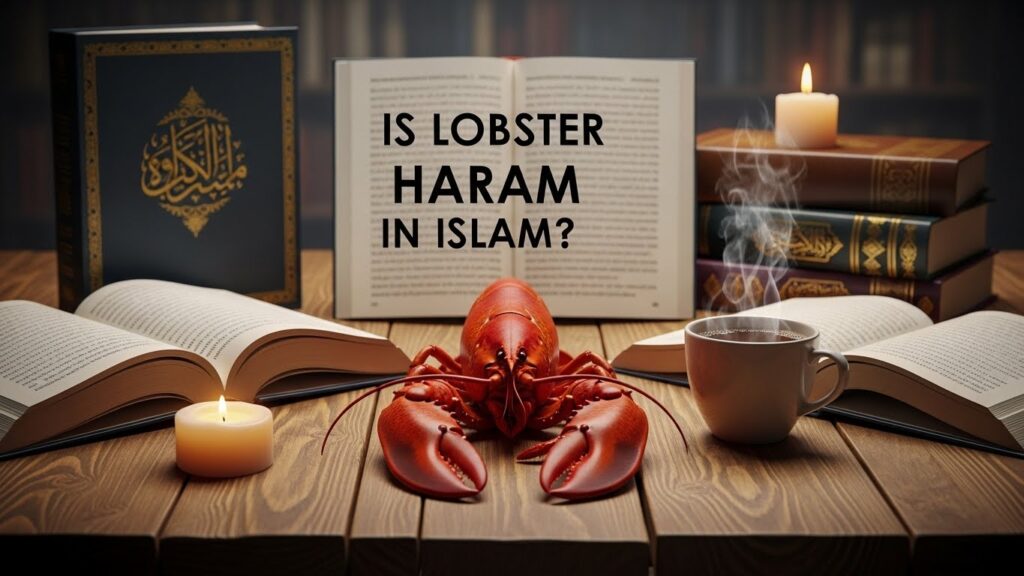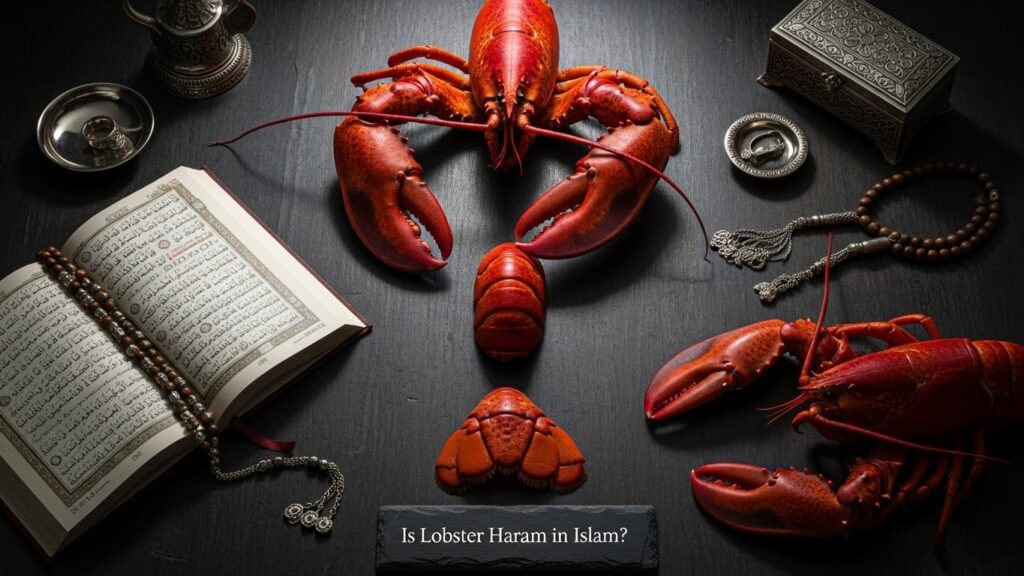Is lobster halal or haram in Islam? Discover what Islamic scholars say about eating lobster and seafood based on Quran and Hadith.
Introduction: Why Muslims Ask If Lobster Is Haram
Many Muslims ask whether lobster is halal in Islam. This question becomes more common in places where seafood is a regular part of daily meals. While Islam clearly allows many types of seafood, foods like lobster often cause confusion because scholars have different views on them.
Islamic dietary laws are based on Quran and the Sunnah of Prophet Muhammad (peace be upon him). Islamic laws guide Muslims on what they can eat as halal and what they must avoid as haram. When it comes to seafood, the rulings are not the same across all schools of thought. This leads to confusion about certain creatures such as lobster.
In this article, we will explore the Islamic view on lobster. We will look at what Quran and Hadith say about seafood review scholarly opinions, and explain why there are different rulings. If you have ever asked, is lobster haram?, this article will help you understand the topic clearly.

What Does Islam Say About Eating Seafood?
Islam allows Muslims to enjoy many types of food including seafood. Quran clearly mentions that food from the sea is a blessing for believers. In Surah Al-Ma’idah (5:96), Allah says:
“Lawful to you is the game from the sea and its food as provision for you and the travelers…”
This verse shows that seafood is generally halal for Muslims. Prophet Muhammad (peace be upon him) also permitted eating sea creatures. One famous hadith states:
“Its water is pure and its dead are lawful.”
(Sunan Abu Dawood, Hadith 83 – graded Sahih)
Most Islamic scholars agree that sea animals are halal. However, different schools of thought apply different principles when it comes to certain creatures.
- The Shafi’i, Maliki, and Hanbali schools allow all creatures from the sea including shellfish like lobster and shrimp.
- The Hanafi school allows only those sea animals that resemble fish. Based on this, some Hanafis may consider lobster as makruh (discouraged) or not halal.
The main principles used to judge seafood are:
- Whether it lives in water full-time
- Whether it is considered harmful or impure
- Whether it dies naturally in water or requires specific slaughter
By understanding these principles and Quranic view Muslims can make informed choices about seafood.
Is Lobster Haram? Scholarly Opinions Explained
Islamic scholars hold different views on whether lobster is halal or haram. These opinions come from the four major schools of Islamic thought. Each school follows Quran and Sunnah but uses different principles to interpret specific rulings.
The Hanafi school often does not consider lobster to be halal. Instead, they classify it as makruh (discouraged). This is because the Hanafi scholars only allow sea creatures that are considered true fish. Since lobster is not a fish it does not fall under what they consider permissible seafood.
On the other hand, scholars from the Shafi’i, Maliki, and Hanbali schools view all creatures that live in the sea as halal. This includes lobster, crab, shrimp and other shellfish. They base their opinion on general Quranic verses that permit eating from the sea without listing specific exceptions.
The differences mainly come down to how each school defines sea animals and how they understand the rules of purity and slaughter. Scholars also consider how the creature lives and dies. For example, if it dies naturally in the water most scholars agree that it does not need to be slaughtered like land animals.
So, is lobster haram? The answer depends on which school of thought you follow. While Hanafis lean toward caution, others clearly allow it. If you follow a certain madhhab, it is best to respect its guidelines. But it is also important to understand that scholars have valid reasons for their views.
Why Do Some Consider Lobster Haram?
Some Muslims consider lobster haram based on specific concerns tied to Islamic dietary laws. These concerns are especially common in the Hanafi school which follows stricter rules about seafood.
One reason is that lobster is not a fish. The Hanafi scholars permit only fish from the sea and they do not include shellfish like lobster in that category. Since lobster does not meet their definition of a fish they do not consider it halal.
Another reason is that lobsters resemble insects or scavengers. Some scholars view sea creatures that look like bugs or feed on waste as impure or questionable for consumption. Because lobsters have hard shells and claws some people feel uncomfortable eating them especially if they are compared to insects.
The method of killing also raises concern. Many people boil lobsters alive, and this practice makes some scholars question whether it is a humane or Islamically acceptable way to kill an animal. Since Islam emphasizes mercy in slaughter boiling a living creature is seen as possibly cruel by some jurists.
These concerns do not make lobster haram in all schools of thought. However, they do influence the rulings of certain scholars, particularly in the Hanafi madhhab. Other schools, like the Shafi’i, Maliki, and Hanbali do not share these restrictions and allow eating lobster.
Understanding these views helps Muslims make informed choices based on their school of thought and personal conviction.
Differences in School of Thought: What Should You Follow?
Islamic law has diversity in opinion, especially when it comes to food related rulings like seafood. These differences come from the four main madhhabs (schools of thought): Hanafi, Shafi’i, Maliki, and Hanbali. Each school uses Quran and Hadith but may interpret certain texts in different ways.
For example, the Hanafi school limits halal seafood to fish only. This is why many Hanafis consider lobster makruh (discouraged) or even not halal. On the other hand the Shafi’i, Maliki, and Hanbali schools accept all creatures from the sea including lobster as halal.
This variety in opinion is part of Islam’s rich tradition. These scholars were sincere and followed evidence from Quran and Sunnah. Their differences should not cause division. Instead, they show how Islam allows room for scholarly discussion.
If you feel confused the best thing to do is ask your local imam or a trusted scholar from your community. Following a madhhab is not about right or wrong. It is about staying consistent with the teachings you learn and trust.
Muslims respect these scholarly differences in opinion. What matters most is sincerity and following knowledge that is grounded in Islamic tradition.

What to Consider When Eating Lobster Today
When you choose to eat lobster make sure you consider a few important points. Some Muslims accept it as halal but you still need to watch how it’s prepared and served.
Start by checking how the lobster is killed. Many places boil lobsters alive, and some scholars find this method cruel. Islam teaches us to treat animals with kindness even when we prepare them for food. Choose restaurants or sellers who use more humane methods if possible.
Next, look out for cross-contamination. Restaurants may cook lobster near pork, alcohol, or other haram items. If you eat at a restaurant ask if they prepare seafood separately. This helps you avoid mixing halal food with haram items.
Also, check for halal certification. Some seafood suppliers and restaurants display halal labels. If you do not see one ask the staff about their process. As a Muslim you should feel confident that your meal follows halal food guidelines.
By taking these steps, you can enjoy lobster in a way that respects your faith and values.
Conclusion: Is Lobster Halal or Haram in Islam?
Muslim scholars often debate whether lobster is halal or not. They rely on Quranic verse:
“Lawful to you is game from the sea and its food…”
(Surah Al-Ma’idah 5:96)
This verse clearly allows seafood, which supports the halal view.
However, scholars from the Hanafi school often do not classify lobster as halal. They base their opinion on its non fish status and the method of its slaughter. Some describe it as makruh meaning disliked rather than clearly haram.
Each school of thought follows authentic scholarly reasoning. Muslims respect these scholarly differences in opinion. You should follow your trusted scholar or local imam if you feel unsure.
When eating lobster today consider how it is prepared. Avoid dishes cooked with haram ingredients.
Look for halal certification and choose restaurants that respect dietary guidelines.
By understanding the views from different schools, you can make a well-informed decision. Follow your conscience and seek knowledge when needed. Your effort to obey Allah brings reward, even in food choices.
